Water Damage Restoration in Denver, CO
Owning a home or business is one of the hallmarks of living the American Dream. While there are many fulfilling and positive aspects of owning property, one of the challenges that owners face is property damage. This type of damage can be caused by a range of disasters, both man-made and natural. Of all the types of property damage, water damage is among the most common.
Whether from broken pipes or heavy thunderstorms, it doesn't take a professor from University of Denver in Denver to know that water damage can be incredibly harmful to your home. Water can spread quickly throughout your property, causing damage to furniture and porous materials as it moves. In the blink of an eye, you could be looking at substantial rotting, warping, and even mold growth. That's why water damage restoration in Denver, CO is so important - to mitigate the damage to your home and help prevent it from happening in the future.
Trying to overcome flooding and other water-related disasters on your own can seem like a lost cause. But with Disaster Response by your side, you don't have to lose hope. As a local water damage clean-up company, we provide comprehensive restoration services to properties of all sizes in Denver. From the first time we assess your water damage to the time we mitigate and restore, we're here for you.
Dealing with property damage can be overwhelming. You're likely concerned about a few key things:

Navigating the insurance claim process
We guide you through every step, ensuring you understand the process and get the most out of your claim.

Scheduling for a quick and quality completion
We provide a clear timeline for restoration, prioritizing both speed and quality, so you can get back to normal as soon as possible.
You might also be thinking about:

Ensuring the safety and health of your family or employees during the restoration: Our team takes all necessary precautions to protect the safety and health of everyone involved, using the latest techniques and equipment.

Understanding the full scope of the damage and what needs to be done:We conduct a thorough assessment of the damage and provide a detailed plan of action, so you know exactly what to expect.

Knowing the costs upfront and avoiding unexpected expenses: We provide transparent pricing and a detailed estimate before any work begins, so there are no surprises along the way.

Preventing future issues, such as mold growth or structural problems: We don't just fix the visible damage—we address the root causes to prevent future issues, giving you peace of mind.

Protecting your belongings and valuables from further damage: We take extra care to safeguard your possessions during the restoration process, minimizing any further impact.



Minimizing disruption to your daily life or business operations: We work efficiently and flexibly to reduce the disruption to your routine, allowing you to continue with your life or business as smoothly as possible.

Finding a trustworthy team to handle your property with care: Our experienced and highly-trained professionals treat your property as if it were their own, ensuring the highest standard of care.

Ensuring the job is done right the first time: We pride ourselves on doing the job right the first time, using industry-leading techniques and thorough quality checks to ensure lasting results.

Receiving clear communication and updates throughout the restoration process: We keep you informed every step of the way, providing regular updates and clear communication, so you're never left in the dark.

Ensuring the safety and health of your family or employees during the restoration: Our team takes all necessary precautions to protect the safety and health of everyone involved, using the latest techniques and equipment.

At Disaster Response, It's All About You
Like Daniels Fisher in Denver, Disaster Response has been a pillar of the community for years. As a second-generation disaster response company, we know that our work is never about us. At its most basic, it's always about you—your situation, your needs, and your satisfaction. We engineer our processes to help you quickly recover from water floods and disasters. Our total focus is on you, our valued customer. And that, in a nutshell, is what makes Disaster Response one of the most trusted and highly-rated water restoration companies in Denver.
Instead of focusing on profit, bottom lines, and yearly projections, we make you our priority. That's why we're serious about providing expert-level disaster preparedness and response services when you need them the most. Could you imagine trying to decipher misleading fine print or dealing with a pushy salesperson when you're just trying to get your life back together? That's not the Disaster Response way, and it never will be.
We don't just clean up after water leaks, floods, or other disasters; we go above and beyond by providing a consultative approach that serves you for years to come. We assist you in dealing with insurance adjusters to ensure you get the coverage you deserve without unnecessary delays. We make it a point to meticulously review every detail of your claim and work hard to make sure adjusters understand the full extent of your losses. We can also provide guidance on how and when to engage a public adjuster to bypass inefficiencies in the insurance process. At the end of the day, we strive to provide peace of mind during your difficult time and work tirelessly to get your property back to its pre-loss condition.
The Disaster Response Difference

Professional Technicians, Technology, and Processes
In fact, we'll dispatch a team of water disaster technicians to you within three minutes. We'll also advise you on what can be done to minimize the water damage in your home or business. Our water damage restoration team will use cutting-edge technology and IICRC-approved methods to restore as much of your property as possible.

Insurance Advocacy
Disaster Response works one-on-one with you and your insurance provider to expedite the claims process and get your home back to normal as soon as possible.

Satisfaction Guaranteed
We're proud of our work and stand behind every project we complete. Our goal is to exceed expectations and provide peace of mind throughout every step of your water damage restoration process. If you're not satisfied for any reason, we'll listen to your concerns and work tirelessly to rectify any issues that need addressing.

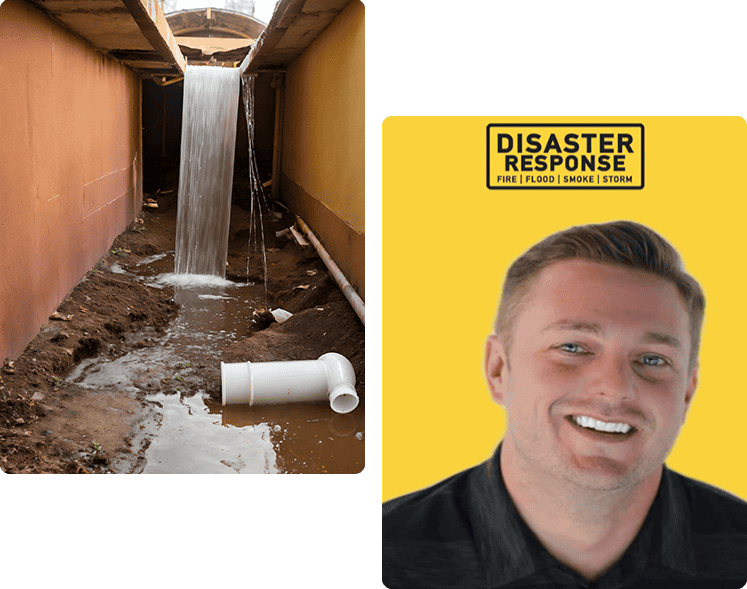
Your Guide to Water Damage Restoration in Denver, CO
Water damage restoration is a key step in remediating damage to your home, both structurally and aesthetically. Damage from water doesn't just affect the walls, floors, and ceilings in your home. It can also cause deeper issues that, when untreated, can weaken your foundation significantly and lead to long-term instability.
As if that weren't enough, water damage can present health hazards to your friends, family, and pets. Mold and bacteria can grow in damp areas after water incidents, causing allergies, respiratory problems, and even visits to The Courtyards at Mountain View in Denver for examination. Ignoring water damage can also result in irreversible harm to your belongings, including furniture, electronics, and sentimental items, leading to financial loss and emotional distress. Professional water clean-up services can repair the damage to your property, help protect valuable assets, and re-establish your home or business as a safe, healthy environment for occupants.
What Makes Our Water Damage Company in Denver, CO, Different from Others?
One of the most common questions we get at Disaster Response is, "What separates you from other water damage clean-up companies in Denver?" The first and easiest answer to that question centers around our commitment to customer service. We hold our clients in high regard because, without them, there would be no Disaster Response. As such, we work tirelessly to provide them with quality work from friendly and helpful technicians, regardless of the size of their home or business.
But that's just the start. Our clients recommend friends and family to our business because we prioritize the following:

Cost
Investing in damage restoration for your home is a smart move that can help reduce long-term costs. The best part? Our services are covered by insurance companies, so there's less worry about paying out of pocket.

Technicians
Every member of our team has years of experience, specialized training, and certifications in handling water damage. We prioritize our customers' well-being and meticulously attend to every detail to prevent any potential mold-related issues in the future. From single-family homes to
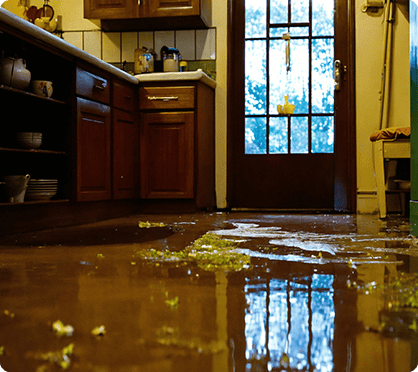
Time
Water disasters happen quicker than you might think. One moment, you're enjoying family time at Paco Snchez Park in Denver. The next, you're pulling in your driveway to a flooded home. When you call our office, we'll get to work assessing the cause of your water damage and how extensive the water damage is in your home or business. From there, we'll dispatch a team of IICRC water damage restoration experts to your location.
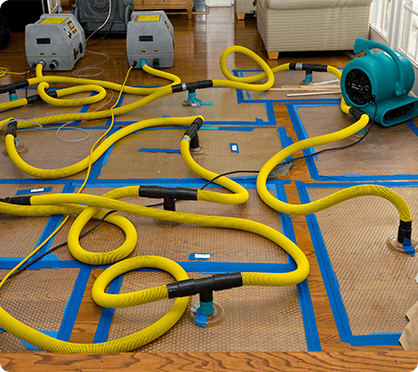
Tools
Disaster Response has made significant investments in cutting-edge water damage equipment, including inspection tools that enable thorough water removal. Our technicians have undergone extensive training to operate these machines and know when and when not to use them.
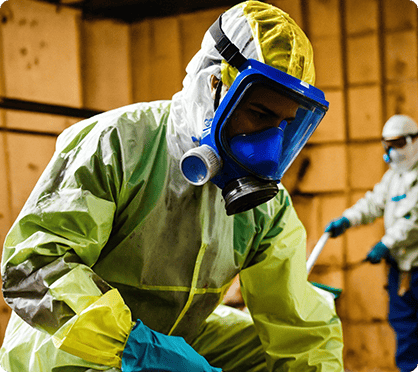
Process
For over 40 years, we have been helping with water damage issues, refining our process along the way. We can quickly find hidden damages that others might miss and document everything for your insurance company.

Reliable Water Damage Restoration Network
We aren't afraid to ask for help if it means a safer, more enjoyable environment for your family or customers. In fact, we have access to a network of industry pros who are experts in a range of water damage services. To make your life a little easier, we also work with insurance professionals who assist with the claims process.
What Does Disaster Response Fix?
As an IICRC-certified water damage contractor in Denver, CO, our technicians can address several areas of your home or business that have been damaged by a water disaster.
- Floors: It's very important to take the necessary time and steps to effectively dry your floors to prevent any potential water damage and mold growth in the future.
- Walls: Depending on the amount of water that enters your business or home, the structural integrity of your property may be at stake. Our technicians will evaluate the situation, inspect your property, and replace materials damaged by water.
- Rugs: If your rugs get wet during flooding or from another water disaster, they may be salvageable. We'll work hard to save all the rugs in your property.
- Furniture: Your furniture is probably expensive and may hold a certain level of sentimental value. Instead of throwing it away or donating it to Four Mile Historic Park in Denver, we can repair and restore it.
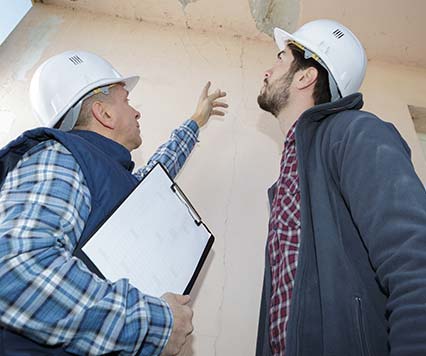
Disaster Response specializes in every kind of damage caused by rain, wind, or snowstorms. We handle water damage, mold, mildew, and more, and can be at your home or office within an hour of your call to assess the situation and put a water damage restoration plan into action.
What Tools Does Disaster Response Use for Water Damage Clean-Up?
We only use the best equipment! With our extensive experience in the Denver restoration industry, we've acquired state-of-the-art tools designed to tackle a wide range of challenges. This experience has also allowed our technicians to identify which type of equipment is best for a particular situation. Some of the most common water damage restoration tools we use include:

Infrared Cameras
Our infrared cameras give us the ability to see moisture in walls and ceilings that is not visible to the naked eye, almost like having "X-ray" vision. This capability allows us to detect and address trapped and hidden humidity, significantly reducing the risk of mold growth.

Moisture Meters
We use moisture meters to measure moisture levels in cellulose material. Before and after the drying process, we will conduct moisture readings in all areas of your property. If we detect moisture in an unaffected area of your building, we'll get to work quickly to dry it.

Air Movers
This equipment is designed to work in conjunction with our dehumidifiers. While our dehumidifiers extract moisture from the air and convert it to a liquid, our Air Mover helps to circulate this moisture in the air so that the dehumidifier can effectively remove it.

Ozone Generators
These advanced tools enable us to cleanse affected surfaces and the air in a more effective manner. Ozone Generators work by causing oxygen molecules to implode, making them a valuable deodorization tool.

Xtreme Xtractor
This tool is great for tackling tough moisture after water damage. It allows us to apply direct pressure to a surface, like a carpet, that has soaked up water. The pressure helps draw out the water, making it easier to remove.
Top 3 Types of Water Damage You Should Know About
Water damage can strike without warning and can wreak havoc on your property, leaving you feeling hopeless and overwhelmed. Whether it's from a burst pipe, a severe storm, or an overflowing appliance, your property needs immediate water damage clean-up in Denver, CO, to prevent further harm. Here are the top three types of water damage you should know about:
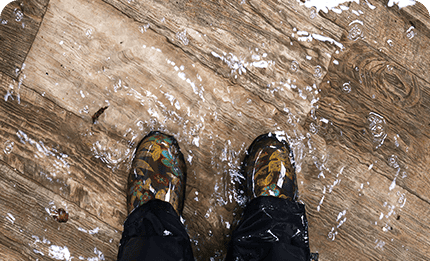
Clean Water Damage

This type of water damage happens from a "clean" source, such as rainwater or a broken pipe in your home. It's easier to clean up than others on this list but can still cause extensive property damage when ignored.
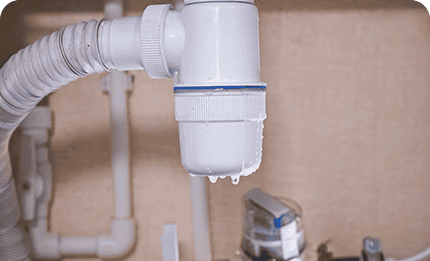
Gray Water Damage

Gray water damage stems from appliances such as toilets without feces, washing machines, and dishwashers. Gray water sometimes contains bacteria and contaminants that can make you or your family sick.
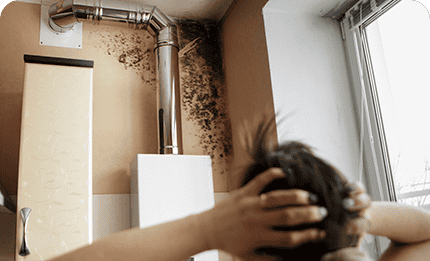
Black Water Damage

The name alone indicates the severity of this type of water damage. It's caused by backed-up sewer lines, river flooding, and standing water that supports bacteria growth. Black water presents serious health hazards and needs to be handled by professional water damage contractors.
If you suspect your home or business has been damaged by one or more of the types of water above, take the following steps:
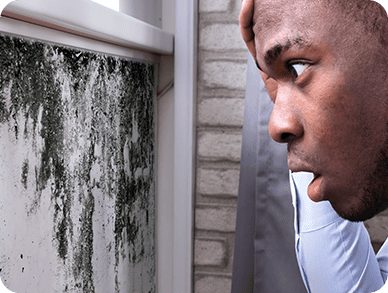
- Be Safe: Turn off all electricity running through your property. Don't go near or touch any water you believe to be contaminated.
- Stop the Source of Water: If you're able, put a stop to the water at its source. That way, you can prevent more damage.
- Call Disaster Response: Contact our water damage company ASAP for water restoration services. Our team is available 24/7 to respond to emergencies.
Our Process for Water Damage Restoration in Denver, CO
Having a water damage restoration company by your side who knows how to remediate moisture is a key factor in getting your life back on track. At Disaster Response, we have refined our process over 40+ years of water damage clean-up experience. That way, we can provide customers with reliable, comprehensive service when they need it the most.
We utilize powerful pumps and vacuums to eliminate standing water from your property. Swift water removal is essential in minimizing damage and lowering the likelihood of mold growth. Our team is dedicated to ensuring efficient water extraction to prevent any additional complications.
After extracting water from your property, we dry and dehumidify the impacted areas. We use industrial-grade dehumidifiers and air movers to do so to eliminate moisture from walls, floors, and furniture. Proper drying helps prevent warping, swelling, and the growth of mold.
Whenever we deal with water damage, we have to address the potential contaminants and bacteria that can enter your home. We make sure to thoroughly clean and sanitize all affected areas to create a safe living environment. This involves cleaning carpets, upholstery, and personal belongings. Our technicians also use antimicrobial treatments to prevent mold and bacterial growth.
The final step in the process is the restoration of your home to its pre-damage condition. This comprehensive restoration process may encompass a range of tasks, from minor repairs such as replacing drywall and installing new carpeting to major reconstruction efforts. Rest assured that Disaster Response is fully equipped to manage all aspects of water damage restoration, from start to finish.
- Maintenance: Have your business or home's roof, appliances, and plumbing inspected by professionals to spot early signs of wear and tear.
- Water Alarms: If there is a flood or leak in your home, a water alarm can alert you so that you can take action immediately.
- Drainage: Your home needs proper drainage systems in place at all times. To prevent water buildup, be sure to unclog your downspouts and gutters.
- Cracks and Gaps: Be sure to seal up any cracks and gaps in your property's foundation to limit water from getting inside.
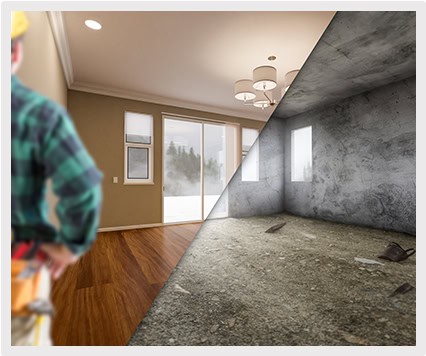
The Water Damage Company in Denver, CO, You Can Trust
When you want a great steak, you don't go to a fast-food joint and expect a filet. You go to a Guard and Grace in Denver. When you need quality disaster response services from licensed professionals, you don't go to a fly-by-night shop. You contact Disaster Response.
As a local water damage clean-up business, we believe that providing clients with effective service that they can rely on in times of stress is of utmost importance. While some of our competitors prioritize profits over people, you can rest easy knowing we care about you - and that's something you can always count on when you choose our water damage company.
Whether a pipe has burst in your commercial space and your showroom is flooding, or your home has standing water from a Denver rainstorm, we're here for you 24/7. Contact our office to learn more about the Disaster Response difference or to schedule an inspection for your property today.
Contact Your Emergency Disaster Response Now!
Latest News in Denver, CO
Weather Impact Day for slick roads in Colorado, high winds Tuesday
KUSA.comhttps://www.9news.com/article/weather/weather-colorado/snow-denver-forecast-weather-impact-day/73-dd0cd89e-f555-4602-80b3-0f6c3c579595
Roads across the Denver metro area are slick and icy Tuesday morning after overnight snow. Winds will pick up in the afternoon.Credit: 9NEWSDENVER — The 9NEWS Weather Impact Team has declared Weather Impact Day on Tuesday morning as commuters will encounter slick and icy roads following a round of overnight snow.While most areas on the Front Range only saw a dusting-3 inches of accumulation, it was enough to make roads slick and icy late Monday night. It will remain icy Tuesday morning until the sun can melt away t...
Roads across the Denver metro area are slick and icy Tuesday morning after overnight snow. Winds will pick up in the afternoon.
Credit: 9NEWS
DENVER — The 9NEWS Weather Impact Team has declared Weather Impact Day on Tuesday morning as commuters will encounter slick and icy roads following a round of overnight snow.
While most areas on the Front Range only saw a dusting-3 inches of accumulation, it was enough to make roads slick and icy late Monday night. It will remain icy Tuesday morning until the sun can melt away the snow and ice.
Be careful on the roads Tuesday morning, especially before sunrise — 7:10 a.m. in Denver. Temperatures plunged into the teens across the Denver metro area, keeping the roads extra slick and icy.
Cherry Creek Schools, Jeffco Public Schools, Englewood Schools, Littleton Public Schools, Platte Canyon District 1, Douglas County School District, and Elizabeth School District are among the closures with delayed starts on Tuesday.
> See the full list of closures and delays
The main weather story on Tuesday will be the wind. Winds pick up through the day, with 30-40 mph gusts likely in Denver Tuesday and a high only in the mid-30s, while those winds will really ramp up for the foothills and higher Front Range peaks. Some 60-70 mph gusts are possible there, especially after dark Tuesday night.
Finally, there is some mountain snow Tuesday as well, with 1-4 inches possible along and north of I-70 today as we squeeze out the last bits of moisture from our departing storm.
RELATED: School districts announce delayed starts during slick Tuesday morning commute
Credit: 9NEWS
The forecast ahead for Colorado will turn quiet after Tuesday with highs mainly in the 50s for the rest of the week with no meaningful rain or snow chances in Denver through the upcoming weekend.
The mountains of Colorado could get more light snow on Thursday night and Friday, along with Sunday.
RELATED: Snow causes slick roads in Denver metro area
Credit: 9NEWS
Denver forecast
Credit: KUSA
It's Not Looking Like Broncos Will Get CB Riley Moss Back vs. Colts
Chad Jensenhttps://www.si.com/nfl/broncos/news/riley-moss-broncos-injury-rumor-colts-update
The Denver Broncos have been without starting cornerback Riley Moss since he suffered a knee injury early in the team's Week 12 victory over the Las Vegas Raiders. The Broncos weathered the storm at Allegiant Stadium without Moss, but his absence was acutely felt vs. the ...
The Denver Broncos have been without starting cornerback Riley Moss since he suffered a knee injury early in the team's Week 12 victory over the Las Vegas Raiders. The Broncos weathered the storm at Allegiant Stadium without Moss, but his absence was acutely felt vs. the Cleveland Browns on Monday Night Football, with Jameis Winston passing for 497 yards and Jerry Jeudy's record-breaking 235 receiving yards.
The Broncos emerged victorious over the Browns 41-32, but it was a lot closer than even that score would suggest.
With the Broncos coming off their Week 14 bye, there's been hope that Moss will return this week to face the Indianapolis Colts. While head coach Sean Payton held a conference call with local reporters on Monday morning, the Moss subject wasn't broached.
However, KOA Radio's Benjamin Allbright tweeted on Monday afternoon a deflating prediction that Moss might not be back until Week 17 vs. the Cincinnati Bengals. Keep in mind, Allbright is expressing an opinion, not reporting a scoop.
"It’s gonna be a bit. I suspect it’ll be Cincinnati before he’d be back," Allbright wrote on X in response to a follower asking for a Moss update.
The Broncos haven't spoken to Moss' injury or future availability since November 24, but the team decided not to put him on injured reserve, which is a four-week minimum stay. We'll get our first solid sign from the Broncos on Moss' outlook when Wednesday's practice report rolls out.
But we did get a little circumstantial evidence to support Allbright's read on the Moss situation on Monday when news broke of the Broncos working out veteran cornerback Jerry Jacobs. If Jacobs signs to the practice squad this week, it'll be a likely harbinger of Moss missing more time.
While it's not the news Broncos Country hoped to hear, let's try to look on the bright side. The Broncos will host Colts quarterback Anthony Richardson, who, despite a phenomenal arm, has struggled as a passer in Year 2.
The Colts have the sixth-fewest passing yards as a team this season, and as a starter, although Richardson sits with a 5-4 record, he's totaled just 1,511 passing yards and seven touchdowns with nine interceptions. Suffice it to say, the Colts are hoping for better than a 7-to-9 TD-to-INT ratio from their recent No. 4 overall pick, but this is basically his rookie year after he missed 2023 with an injury.
The Broncos will have to be on their toes with Richardson, as he's a bonafide dual-threat quarterback. He's totaled more rushing yards than Bo Nix (383) in four fewer games, with four touchdowns on the ground, just like the Broncos' rookie.
Could the Broncos really use Moss this week, out there on the boundary with his sure-fire tackling and nose for the ball? Absolutely. But if he's not ready, he's not ready.
The more concerning matchup to be sans Moss is the following week when the Broncos travel to take on the Los Angeles Chargers in what could be a throwdown to decide who gets the No. 5 seed in the AFC playoffs. That is, assuming the Broncos take care of business on Sunday vs. the Colts.
Moss was a 2023 third-round pick out of Iowa. He missed a good chunk of his rookie season with an offseason surgery and when he was activated to the roster, the limited reps he received were on special teams.
However, in training camp this past summer, Moss took a stranglehold on the No. 2 cornerback job opposite Patrick Surtain II and never looked back. Moss has been an enormous upgrade and boon to the Broncos defense.
In 12 starts this season, Moss 71 tackles (53 solo), an interception, a fumble recovery, and eight pass break-ups. He ranked second on the team in tackles before his injury and even after missing the better part of two games so far, he still ranks third behind safety Brandon Jones and linebacker Cody Barton, both of whom have 82 combined tackles.
By the time the Broncos lace 'em up vs. the Colts, Moss will have had three weeks of recovery time from a knee injury that Coach Payton minimized as not serious following the Raiders win.
"Fortunately it wasn't really serious with Riley," Payton reluctantly revealed at the podium in Vegas on November 24. "It's an MCL. I'm not going to give anything. We'll see how next week is. There was some thought he could go back in. We'll see where it's at."
Cut Payton some slack if he misread Moss' injury. The Broncos were on the road, away from their own facilities, and it was in the immediate aftermath of a game in which Payton was juggling many, many different responsibilities.
Here's to hoping Moss gets back sooner than later.
Follow Denver Broncos On SI/Mile High Huddle on X and Facebook and subscribe on YouTube for daily Broncos live-stream podcasts!
Snow causes slick roads in Denver metro area
KUSA.comhttps://www.9news.com/article/weather/weather-colorado/road-conditions-colorado-snow/73-45a6879d-4955-42eb-afdf-8207f0815533
Snow showers started in Denver around 5 p.m. and ended around 7:30 p.m., producing a quick burst of snow during the evening drive.CASTLE ROCK, Colo. — A snowstorm that slowed travel between Denver and Colorado Springs Monday morning brought slick roads to the Denver metro area after sunset.Snow showers started in Denver around 5 p.m. and ended around 7:30 p.m., producing a quick burst of snow -- a dusting to 2 inches -- during the evening drive.Police and sheriff's offices across the Denver metro area -- including ...
Snow showers started in Denver around 5 p.m. and ended around 7:30 p.m., producing a quick burst of snow during the evening drive.
CASTLE ROCK, Colo. — A snowstorm that slowed travel between Denver and Colorado Springs Monday morning brought slick roads to the Denver metro area after sunset.
Snow showers started in Denver around 5 p.m. and ended around 7:30 p.m., producing a quick burst of snow -- a dusting to 2 inches -- during the evening drive.
Police and sheriff's offices across the Denver metro area -- including Denver, Douglas County, Centennial, Littleton, Broomfield and Arvada -- reported slick, snowpacked roads and low visibility Monday night.
Some schools in the Denver metro area are on a delayed start Tuesday morning.
> Denver plow tracker> CDOT plow tracker> Closings and delays
Monday morning, northbound Interstate 25 was closed at Plum Creek Parkway near Castle Rock for multiple crashes.
A band of snow covered the I-25 corridor from Centennial to Pueblo around 10:30 a.m. The band cleared out around Castle Rock by early afternoon, but heavy snow was still falling farther south around Colorado Springs.
Snow is ending from north to south Monday night. A Winter Weather Advisory for an area west and south of Denver ended at 10 p.m. It'll be clearing and very cold overnight, with lows in the upper teens.
In the mountains, there's a Winter Weather Advisory for the Wet and Sangre de Cristo Mountains of southern Colorado until 5 a.m. Tuesday. That's where 4-10 inches of heavy, wet snow could fall, mainly Monday night.
After Monday's storm, skies will clear out quickly on Tuesday but remain chilly with highs likely staying below 40 degrees. Winds will be an issue on Tuesday, especially in the foothills, where 50+ mph gusts are possible.
Then we rebound into warmer highs in the 50s to finish the week.
FORECAST: Full forecast
Cold front arrives in Colorado, chances of snow in Denver area
KUSA.comhttps://www.9news.com/article/weather/weather-colorado/denver-snow-weather-forecast-colorado/73-b997b72a-caf1-4850-a1d3-512d667ac2ff
Cooler air has moved into Colorado with areas of light snow for the mountains. Some light snow is also likely for the southern foothills and Palmer Divide.Credit: KUSADENVER — After a mild and dry weekend, a cold front has entered Colorado, ushering in a chance for snow Monday afternoon and Monday night in the Denver area.A Winter Weather Advisory is up for the Palmer Divide and the south and west sides of the metro area, where 2-7 inches of snow could fall by tonight. Most areas will see closer to two inches, but ...
Cooler air has moved into Colorado with areas of light snow for the mountains. Some light snow is also likely for the southern foothills and Palmer Divide.
Credit: KUSA
DENVER — After a mild and dry weekend, a cold front has entered Colorado, ushering in a chance for snow Monday afternoon and Monday night in the Denver area.
A Winter Weather Advisory is up for the Palmer Divide and the south and west sides of the metro area, where 2-7 inches of snow could fall by tonight. Most areas will see closer to two inches, but some road impacts are likely on the Divide above 6500' around and near Monument Hill.
The cold front will bring much colder temperatures to the Denver area. Daytime temperatures will be above freezing Monday, meaning it will be very difficult for snow to stick to anything and accumulate.
RELATED: Road conditions: Snowstorm slows travel between Denver and Colorado Springs
The best chance for snow in the Denver metro area comes probably after noon on Monday, but little to no accumulation is expected.
If the snow lingers into the evening hours between 4-9 p.m. Monday, that's probably the best chance for Denver to pick up a little snow on the grassy areas, rooftops, and other cold surfaces. That accumulation, if any, will likely remain under one inch. Other parts of the south and west metro areas above 6,000 feet in elevation still have the potential to get between 1 and 3 inches.
In the mountains, there's a Winter Weather Advisory for the Wet and Sangre de Cristo Mountains of southern Colorado until 5 a.m. Tuesday. That's where 4-10 inches of heavy, wet snow could fall, mainly Monday night.
After Monday's storm, skies will clear out quickly on Tuesday but remain chilly with highs likely staying below 40 degrees. Winds will be an issue on Tuesday, especially in the foothills, where 50+ mph gusts are possible.
Then we rebound into warmer highs in the 50's to finish off the week.
RELATED: Cold front arrives in Colorado, chances of snow in Denver area
Credit: 9News
Snow Forecast
Credit: 9News
Front Range Snow Forecast
Denver forecast
Credit: KUSA
RADAR: Live Interactive Radar
CLOSINGS: Latest closings and delays in Colorado
WEATHER LINE 9: Updated weather forecast information at 303-871-1492.
East Colfax brewery closing after 10 years of pouring literature-themed craft beer
Jonathan Shikeshttps://www.denverpost.com/2024/12/06/fiction-beer-closes-denver-colfax-after-10-years/
After a decade of pouring some of the most innovative beers on Denver’s east side, Fiction Beer Company said Friday that it will close at the end of the year.The books and literature-themed brewery was ...
After a decade of pouring some of the most innovative beers on Denver’s east side, Fiction Beer Company said Friday that it will close at the end of the year.
The books and literature-themed brewery was founded in September 2014 by Ryan and Christa Kilpatrick, whose love of reading gave name to the business and its beers, including Old Bums & Beat Cowboys, a pale ale inspired by Jack Kerouac’s “On the Road,” and Madame Psychosis, a hazy, New England-style IPA named for David Foster Wallace’s “Infinite Jest.”
The bar at Fiction, 7101 E. Colfax Ave., is also made out of books, while literary quotes adorn the tables. The brewery also hosted a book club.
“After 10 years of business, we’ve made the very difficult decision to close our Denver taproom,” Christa Kilpatrick wrote on Fiction’s social media pages.
“Ryan and I have elected not to renew our Denver taproom lease for another five-year term. There are so many reasons for this, but what it comes down to is that the craft beer business is a difficult and demanding one, and it’s time to move on to less stressful ventures for the sake of our kiddos and ourselves,” she continued. “And although it’s incredibly sad to say goodbye, we are excited to write a new chapter for ourselves as happier and healthier main characters.”
Fiction’s second location in Parker, which has different ownership, will remain open.
During its tenure, Fiction was known for being one of the first breweries to dabble in new styles, whether it was hazy IPAs, Pastry Stouts or Cold IPAs. Its most awarded beer was Alternate Present (inspired by “The Man in the High Castle,” by Philip K. Dick), a German-style schwarzbier that won medals at the Great American Beer Festival and the World Beer Cup.
Located near the Park Hill, Montclair, Mayfair and Lowry neighborhoods, Fiction was — and remains — one of the only breweries on the east side of town.
Kilpatrick said the brewery is now for sale. But in the meantime, she encouraged fans to drop by to drink up the beer and give hugs and high-fives to the staff.
Disclaimer:



 Call us 877-451-9251
Call us 877-451-9251